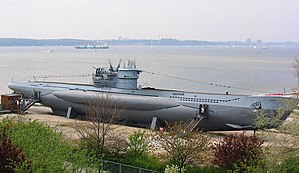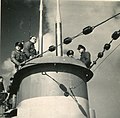
German submarine U-1272

 U-995 Type VIIC/41 at the Laboe Naval Memorial. This U-boat is almost identical to U-1272.
| |
| History | |
|---|---|
| Name | U-1272 |
| Ordered | 23 March 1942 |
| Builder | Bremer Vulkan-Vegesacker Werft, Bremen-Vegesack |
| Yard number | 67 |
| Laid down | 31 May 1943 |
| Launched | 23 December 1943 |
| Commissioned | 28 January 1944 |
| Fate |
|
| General characteristics | |
| Type | Type VIIC/41 submarine |
| Displacement | |
| Length |
|
| Beam |
|
| Height | 9.60 m (31 ft 6 in) |
| Draught | 4.74 m (15 ft 7 in) |
| Installed power |
|
| Propulsion |
|
| Speed |
|
| Range | |
| Test depth |
|
| Complement | 44-52 officers & ratings |
| Armament |
|
| Service record | |
| Part of: |
|
| Identification codes: | M 49 841 |
| Commanders: | |
| Operations: |
|
| Victories: | None |
German submarine U-1272 was a Type VIIC/41 U-boat of Nazi Germany's Kriegsmarine during World War II.

She was ordered on 23 March 1942, and was laid down on 31 May 1943, at Bremer Vulkan-Vegesacker Werft, Bremen-Vegesack, as yard number 67. She was launched on 23 December 1943, and commissioned under the command of Oberleutnant zur See Bernhard Meentzen on 28 January 1944.[3]

Design
German Type VIIC/41 submarines were preceded by the heavier Type VIIC submarines. U-1272 had a displacement of 769 tonnes (757 long tons) when at the surface and 871 tonnes (857 long tons) while submerged. She had a total length of 67.10 m (220 ft 2 in), a pressure hull length of 50.50 m (165 ft 8 in), an overall beam of 6.20 m (20 ft 4 in), a height of 9.60 m (31 ft 6 in), and a draught of 4.74 m (15 ft 7 in). The submarine was powered by two Germaniawerft F46 four-stroke, six-cylinder supercharged diesel engines producing a total of 2,800 to 3,200 metric horsepower (2,060 to 2,350 kW; 2,760 to 3,160 shp) for use while surfaced, two AEG GU 460/8-276 double-acting electric motors producing a total of 750 metric horsepower (550 kW; 740 shp) for use while submerged. She had two shafts and two 1.23 m (4 ft) propellers. The boat was capable of operating at depths of up to 230 metres (750 ft).[4]

The submarine had a maximum surface speed of 17.7 knots (32.8 km/h; 20.4 mph) and a maximum submerged speed of 7.6 knots (14.1 km/h; 8.7 mph). When submerged, the boat could operate for 80 nautical miles (150 km; 92 mi) at 4 knots (7.4 km/h; 4.6 mph); when surfaced, she could travel 8,500 nautical miles (15,700 km; 9,800 mi) at 10 knots (19 km/h; 12 mph). U-1272 was fitted with five 53.3 cm (21 in) torpedo tubes (four fitted at the bow and one at the stern), fourteen torpedoes, one 8.8 cm (3.46 in) SK C/35 naval gun, (220 rounds), one 3.7 cm (1.5 in) Flak M42 and two 2 cm (0.79 in) C/30 anti-aircraft guns. The boat had a complement of between forty-four and fifty-two.[4]

Service history
On 10 May 1945, U-1272 surrendered at Bergen, Norway, after only one war patrol, which resulted in no ship damaged or sunk. She was later transferred to Loch Ryan, Scotland on 30 May 1945. Of the 156 U-boats that eventually surrendered to the Allied forces at the end of the war, U-1272 was one of 116 selected to take part in Operation Deadlight. U-1272 was towed out and sank on 8 December 1945.[3]

The wreck now lies at 55°50′N 10°05′W / 55.833°N 10.083°W.[3]

Gallery
-
U 1272, 1944
-
U 1272, 1944
-
U 1272, 1943
-
U 1272 1943
-
On board U 1272
-
OLt. B. Meentzen, Kptl. OttoLemberg, Hans Ipsen
-
Oberleutnant Bernd Meentzen
-
Oblt. Bernd Meentzen 1944
-
Cabin U 1272
-
Kommando U 1272 1944
See also
References
- ^ Helgason, Guðmundur. "Bernhard Meentzen". German U-boats of WWII - uboat.net. Retrieved 30 March 2016.
- ^ Helgason, Guðmundur. "Hans Schatteburg". German U-boats of WWII - uboat.net. Retrieved 30 March 2016.
- ^ a b c Helgason, Guðmundur. "U-1272". German U-boats of WWII - uboat.net. Retrieved 30 March 2016.
- ^ a b Gröner 1991, pp. 43–44.
Bibliography
- Busch, Rainer; Röll, Hans-Joachim (1999). German U-boat commanders of World War II : a biographical dictionary. Translated by Brooks, Geoffrey. London, Annapolis, Md: Greenhill Books, Naval Institute Press. ISBN 1-55750-186-6.
- Busch, Rainer; Röll, Hans-Joachim (1999). Deutsche U-Boot-Verluste von September 1939 bis Mai 1945 [German U-boat losses from September 1939 to May 1945]. Der U-Boot-Krieg (in German). Vol. IV. Hamburg, Berlin, Bonn: Mittler. ISBN 3-8132-0514-2.
- Gröner, Erich; Jung, Dieter; Maass, Martin (1991). U-boats and Mine Warfare Vessels. German Warships 1815–1945. Vol. 2. Translated by Thomas, Keith; Magowan, Rachel. London: Conway Maritime Press. ISBN 0-85177-593-4.
See what we do next...
OR
By submitting your email or phone number, you're giving mschf permission to send you email and/or recurring marketing texts. Data rates may apply. Text stop to cancel, help for help.
Success: You're subscribed now !










